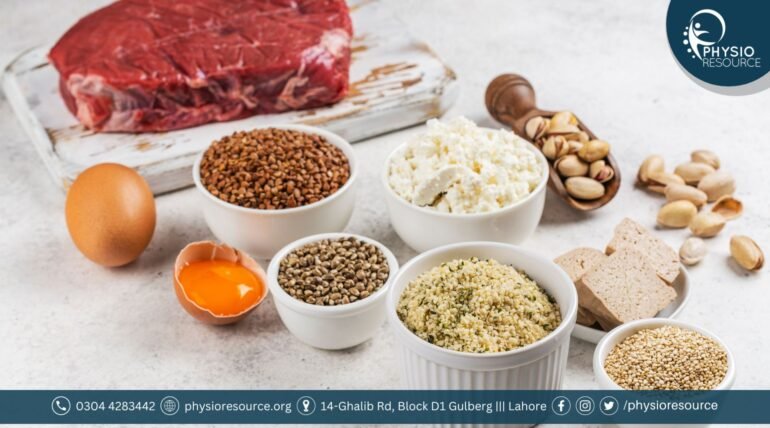
Many people struggle to determine their actual protein requirements. Many people experience this same level of uncertainty. A widespread belief exists that increasing protein intake automatically results in superior health benefits. The statement stands accurate or not? Proper protein intake amounts work to enhance your recovery process while strengthening muscles and enhancing your overall wellness when you target rehabilitation or fitness activities.
Protein serves as a vital nutrient that supports muscle healing, along with immune defense and general wellness. Consuming excessive protein can lead to certain health issues. The key information on protein consumption, including the right amounts and the significance of maintaining a healthy balance, is provided in this blog post.
Why Protein Matters: Your Body’s Building Block
The human body uses amino acids from protein to sustain muscles together with skin tissues and enzymes and hormones. Physiotherapy patients along with athletes and injury patients require protein to restore tissues and develop their physical strength.
Your body has a fixed capacity to digest protein, although many people believe eating more protein leads to better results. The body transforms extra protein into fat or eliminates it through waste products.
How Much Protein Do You Need?
The required amount of protein differs according to these factors:
Age: Older adults need additional protein to preserve their muscle mass.
Activity Level: People who are more active require more protein than those who lead less active lives.
Health Goals: Injury recovery requires higher protein intake to meet increased demands.
Body Weight: Protein intake measurement depends on body weight in kilograms.
General guidelines:
- Every adult requires 0.8 grams of protein for each kilogram of body weight.
- People who are active or undergoing rehabilitation need between 1.2 to 2.0 grams of protein per kilogram of body weight
- Excess protein offers no extra benefits and can strain kidneys.
You may also like: Number 1 Most Underrated High-Fiber Breakfast
Risks of Too Much Protein
Too much protein can cause:
- People with kidney conditions face kidney strain when they experience this.
- Protein metabolism needs water for proper functioning which leads to dehydration.
- Digestive problems which include bloating together with constipation
- Your body can develop nutritional imbalances when you consume insufficient carbohydrates and fats.
- To maintain peak health you need to achieve a balanced intake of protein alongside vegetables together with fruits and healthy fats.
Quality Protein Sources Matter
Adding these healthy protein sources to your diet can help you maintain balanced nutrition:
- Lean meats (chicken, turkey, beef): The iron content in lean meats makes them excellent for muscle healing and energy production.
- Fish and seafood (salmon, tuna, prawns): Your body receives protein benefits along with heart-healthy omega-3 fatty acids when you eat these foods.
- Dairy products (milk, yogurt, cheese): The protein content in dairy products comes together with calcium to maintain bone strength.
- Eggs: Your body can easily digest this complete protein to aid in recovery processes.
- Plant-based sources (lentils, beans, tofu, chickpeas, nuts, seeds): Vegetarians can enjoy these nutritious sources which contain fiber along
Good nutrition combined with balanced protein intake helps both recovery and fitness.
Why Nutrition Matters at Physio Resource
Proper nutrition serves as the essential base for both healing processes and strength development. We understand the importance of protein in your recovery so we dedicate equal attention to your dietary needs as we do to your therapeutic interventions.
Personalized Plans Just for You
Every individual possesses different physiological characteristics. After evaluating your unique health needs, physical activity levels, and rehabilitation goals, our nutrition specialists provide customised protein and meal plans.
Our team of expert nutritionists
We monitor current scientific discoveries to provide you with precise and safe nutritional guidance that works with your daily life.
Your protein needs require personalized direction
Avoid exceeding your protein intake. Through our guidance we determine the appropriate protein quantity and most effective sources for muscle repair which protects you from system overload.
Integrated Nutrition and Physiotherapy Approach
Our dual system ensures that your physiotherapy receives proper nutrition so you can recover faster while regaining strength and mobility and boosting your energy levels more successfully.
Your recovery speed and outcome quality will improve when you work with experts. Through professional nutrition and rehabilitation guidance you will notice enhanced recovery, lower exhaustion and greater quality of life
Schedule your appointment now with best nutritionist Lahore:
The combined services of professional nutritional counseling and expert physiotherapy provide complete healing solutions to make you recover quickly and enhance your strength and wellness.
For support with protein management or customized nutritional plans that match your objectives, contact Best Nutritionist in Lahore at Physio Resource. Your health is our priority!
to receive expert physiotherapy and nutritional guidance in Lahore.
Physio Resource
Phone No: 0304-4283442
Address: 93-A1, Gurumangat Road, Gullberg, III Lahore.


